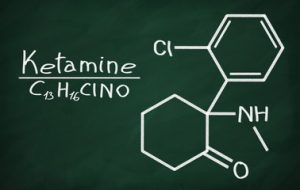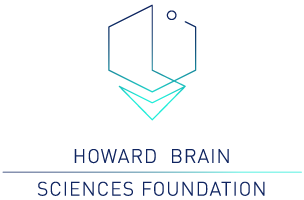In honor of Post-traumatic Stress Disorder (PTSD) Awareness Month the Brain Blog has devoted the past several weeks to review the research of Dr. Pradhan and colleagues. Dr. Pradhan led the development of TIMBER Psychotherapy, a mindfulness-based approach to treating PTSD and other disorders. In our introduction to TIMBER psychotherapy, we reviewed the components of TIMBER. Last week we discussed the history and efficacy of TIMBER. In both articles, we referenced Dr. Pradhan and colleagues’ research combining TIMBER with pharmacological treatment. This week we will provide a more detailed assessment of the use of Ketamine infusions in conjunction with TIMBER.
Ketamine is an N-methyl-D-aspartate-type glutamate (NMDA) antagonist (Liriano, Hatten & Schwartz, 2019). NMDA receptor activation has been found to increase spontaneous intrusive memory formation, and as such is associated with PTSD (Liriano, Hatten & Schwartz, 2019). As ketamine reduces NMDA receptor activation, it may serve well as a treatment for PTSD symptoms (Liriano, Hatten & Schwartz, 2019). Dr. Pradhan and colleagues recognize ketamine’s effectiveness as “short-lived,” doses usually efficacious for 4-7 days, but suggest combining it with a treatment that targets the traumatic memory associations to prolong the ketamine dose’s effect (Pradhan et al., 2017). Thus ketamine infusions can provide extended temporary relief against symptoms (Pradhan et al., 2017). TIMBER reduced negative associations through a combination of memory extinction and memory consolidation as to prevent relapses via creating novel memory associations to replace traumatic ones (Pradhan et al., 2017).
In Pradhan and colleagues’ first study, they compared three groups of participants, those who only received TIMBER treatment, those who received TIMBER treatment and ketamine infusion, and those who received TIMBER treatment and placebo (Pradhan et al., 2017). Patients in the placebo group were switched to ketamine treatment if they experienced a relapse lasting two weeks (Pradhan et al., 2017). TIMBER sessions consisted of “3 sessions in the first week (during infusion, on the 2nd day and on the 8th day), followed by 9 sessions conducted on a weekly basis, 45 minutes duration each” (Pradhan et al., 2017). All patients were diagnosed with PTSD using the PTSD Checklist and Clinician Administered PTSD Scale for DSM-IV (Pradhan et al., 2017).
Participants’ scores on the Clinician Administered PTSD Scale for DSM-IV (CAPS) (baseline mean score 92 ± 11), PTSD Checklist (PCL) (baseline mean score 75.2), Beck Anxiety Inventory (BAI) (mean score 47.9), Hamilton Rating Scale for Depression (Ham-D-17) (baseline mean score 26.9 ± 6.17), and Montreal Cognitive Assessment (MoCA) both before and after ketamine infusions. Overall, combining TIMBER with ketamine infusions prolonged the effect of the dose. Participants additionally reported both reduced symptoms and longer periods of relief (Pradhan et al., 2017). Pradhan and colleagues propose “the two therapies potentiated each other,” patients’ improved TIMBER psychotherapy skills enable a stronger response to the ketamine infusion and the ketamine infusions improve memory reconsolidation (Pradhan et al., 2017).
As this was the pilot design study, Pradhan and colleagues suggested further research with improved sample sizes and a participant group that only receives ketamine infusions without TIMBER psychotherapy sessions (Pradhan et al., 2017). Pradhan and colleagues also noted the potential of d-serine as a biomarker for treatment efficacy (Pradhan et al., 2017).
Basal d-serine has been found to serve as a marker for PTSD severity, ‘associated with acquisition and extinction of fear memory in animals and patients with PTSD’ (Pradhan, Mitrev, Moaddell & Wainer, 2018). In a 2018 study, Dr. Pradhan and colleagues replicated their pilot study but additionally measured basal d-serine level “prior to the initiation of the infusion (basal) and at the end of the infusion (40-min)” (Pradhan et al., 2018).
Decreased basal d-serine levels were found in patients administered ketamine and generally correlated with decreased symptoms. Pradhan and colleagues also suggested ‘that changes in DSR plasma concentrations may reflect the effect of mindfulness meditation on stress-related symptoms” (Pradhan et al., 2018).
TIMBER Psychotherapy For PTSD, Depression, and Traumatic Psychosis also references biomarkers as the future direction of TIMBER psychotherapy research, as well as increased research and development of The Arousal Response to Trauma Memory Reactivation (ART-MR©) Scale (Pradhan, Pinninti & Rathod, 2019). ART-MR scale “is a clinician-rated scale that measures the level of biobehavioral and cognitive-emotional arousal responses” and can be used to assess patient arousal without verbal cues (Pradhan, Pinninti & Rathod, 2019).
For further reading on the pharmaceutical use of ketamine, you can read about ketamine as an antidepressant or review this article’s citations from Dr. Pradhan and colleagues. For more about TIMBER or its predecessor Y-MBCT, you can view Dr. Pradhan’s lectures online (on TIMBER, on Y-MBCT). Lastly, HBSF’s patient advocacy team can be reached at patientadvocacy@brainsciences.org for additional resources regarding neurodegenerative diseases and other forms of mental illness.
Written by Senia Hardwick
References
Liriano, F., Hatten, C., & Schwartz, T. L. (2019). Ketamine as treatment for post-traumatic stress disorder: A review. Drugs in Context, 8. https://doi.org/10.7573/dic.212305
Pradhan, B., Mitrev, L., Moaddell, R., & Wainer, I. W. (2018). D -serine is a potential biomarker for clinical response in treatment of post-traumatic stress disorder using (R , s)-ketamine infusion and timber psychotherapy: A pilot study. Biochimica et Biophysica Acta (BBA) – Proteins and Proteomics, 1866(7), 831–839. https://doi.org/10.1016/j.bbapap.2018.03.006
Pradhan, B., Pinninti, N. R., & Rathod, S. (2019). Timber psychotherapy: For ptsd, depression and traumatic psychosis. Springer International Publishing. https://doi.org/10.1007/978-3-030-20648-2
Pradhan, B.K, Wainer, I., Moaddel, R., Torjman, M., Goldberg, M., Sabia, M., Parikh, T., & Pumariega, A. (2017). Trauma Interventions using Mindfulness Based Extinction and Reconsolidation (Timber) psychotherapy prolong the therapeutic effects of single ketamine infusion on post-traumatic stress disorder and comorbid depression: A pilot randomized, placebo-controlled, crossover clinical trial. Asia Pacific Journal of Clinical Trials: Nervous System Diseases, 2(3), 80. https://doi.org/10.4103/2542-3932.211589
Zhang, K., & Hashimoto, K. (2019). An update on ketamine and its two enantiomers as rapid-acting antidepressants. Expert Review of Neurotherapeutics, 19(1), 83–92. https://doi.org/10.1080/14737175.2019.1554434
